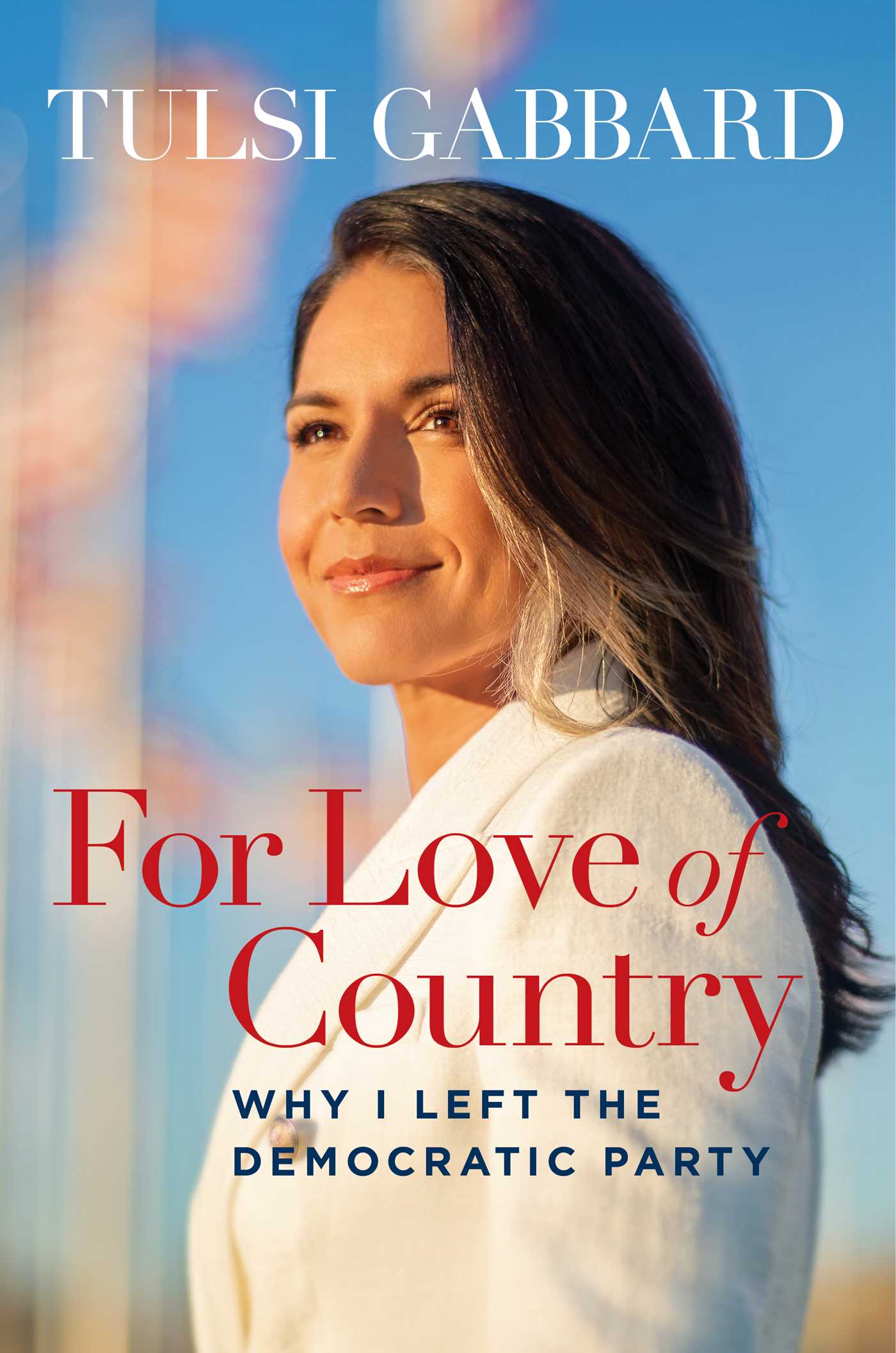
For Love of Country: Leave the Democrat Party Behind
Tulsi Gabbard
About the Author

Tulsi Gabbard
Questions & Answers
Tulsi Gabbard identifies an existential crisis in the United States rooted in the erosion of democracy, rule of law, and individual freedoms. This crisis is exacerbated by political leaders who prioritize their own interests over those of the American people, using law enforcement and national security to silence opposition and undermine democracy. The current political climate, characterized by polarization and the influence of the military-industrial complex, exacerbates this crisis. Gabbard argues that the failure of both major political parties to address these issues, particularly the Biden administration's actions against former President Trump and the open border policy, threatens the very fabric of American society. She advocates for a return to the foundational principles of the Constitution and the protection of unalienable rights, emphasizing the need for a government of, by, and for the people.
Tulsi Gabbard critiques the Democratic Party and the Washington establishment for their undermining of democratic principles and mistreatment of political opponents. She argues that the elite within these groups use the national security state and law enforcement to target political adversaries, such as former President Trump, and undermine the rule of law. Gabbard highlights the selective application of justice, where the elite are above the law while others face harsh scrutiny. She also criticizes the erosion of free speech, noting the use of Big Tech and social media censorship to silence dissenting voices. Gabbard further condemns the party's hostility towards religion and its undermining of family values, particularly through policies that challenge parental authority and promote gender ideology. She views these actions as a threat to democracy and calls for a return to the foundational principles of the Constitution and the Bill of Rights.
Tulsi Gabbard's argument emphasizes the erosion of American values, particularly free speech and religious freedom, under the current political climate. She claims that the Democrat elite, through censorship, surveillance, and political pressure, are undermining these fundamental rights. The implications of her argument include:
-
Undermining Democracy: By silencing dissenting voices and controlling information, the government is preventing the informed participation of citizens, essential for a functioning democracy.
-
Weakening of Civil Liberties: The targeting of individuals and groups for their beliefs or political views threatens the principle of equality before the law and the right to privacy.
-
Marginalization of Religious Freedom: The hostility towards people of faith and the attempt to remove God from public life challenges the religious freedom guaranteed by the First Amendment.
-
Risk of Authoritarianism: The trend towards censorship and control indicates a move away from democratic principles towards authoritarian governance.
-
Divisiveness: The selective application of free speech and religious freedom can exacerbate divisions within society, leading to a fragmented and unstable nation.
Gabbard's argument calls for a return to the foundational principles of American values, emphasizing the need for a free and open society where all voices are heard and all rights are protected.
Gabbard proposes addressing the challenges by advocating for a return to the foundational principles of the Constitution, emphasizing the rule of law, and defending individual rights and liberties. She advocates for:
- Ending Political Polarization: She calls for unity among Americans, regardless of political affiliation, to combat the division caused by the Democrat elite.
- Restoring Free Speech: Gabbard argues for the protection of free speech and religious freedom, opposing censorship and the suppression of dissenting views.
- Reforming National Security and Law Enforcement: She criticizes the misuse of national security state and law enforcement against political opponents, advocating for a neutral and fair application of the law.
- Promoting Peaceful Diplomacy: Gabbard emphasizes the importance of diplomacy over military action, particularly in international relations, to prevent conflicts and nuclear threats.
- Supporting Families and Education: She advocates for parental rights in education and opposes policies that undermine family values and the well-being of children.
- Electoral Integrity: Gabbard supports electoral reforms to ensure fair and transparent elections, emphasizing the importance of informed and active citizen participation.
In terms of leadership, Gabbard advocates for leaders who prioritize the well-being of the American people and the nation over personal or partisan interests, and who are committed to upholding the Constitution and the Bill of Rights.
Tulsi Gabbard's personal background and spiritual beliefs significantly shape her political views and approach to the issues in her book. Born to a Caucasian mother and a Polynesian father, Gabbard grew up in Hawaii, a melting pot of cultures, which instilled in her a sense of interconnectedness and respect for diversity. Her spiritual beliefs, rooted in Hinduism, emphasize love, respect, and compassion, which inform her advocacy for religious freedom and against discrimination.
Her military service, including deployments to war zones, has given her a firsthand understanding of the importance of freedom and the cost of defending it. This experience informs her views on national security, foreign policy, and the need for peace. Gabbard's dedication to the Constitution and its protections, including free speech and religious liberty, is deeply influenced by her belief in the inherent rights and freedoms granted by God.
Her criticism of the Democratic Party's current direction, particularly its perceived undermining of these freedoms, stems from her belief that the party has abandoned its core values. Gabbard's approach to issues like free speech, religious liberty, and racial division is guided by her commitment to the principles of aloha, which emphasize unity, respect, and shared responsibility.